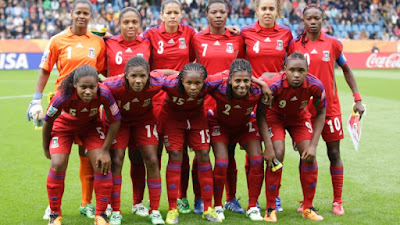 Despite their early exit from the FIFA Women's Worldcup Germany 2011 the Nzalang Nacional of Equitorial Guinea drew a different kind of attention, full of curiousness to its nation. Being one of the smallest nations in Africa and in the world, and without much of a spectacular presence in women's football before 2008, this team enjoyed the luxury of no-expectations. However their participation at the World Cups 2011 invoked enough curious minds to take a trip to a small nation of less than a million inhabitants. A Sister in Germany happens to be have one of such minds...so join my ride....
Despite their early exit from the FIFA Women's Worldcup Germany 2011 the Nzalang Nacional of Equitorial Guinea drew a different kind of attention, full of curiousness to its nation. Being one of the smallest nations in Africa and in the world, and without much of a spectacular presence in women's football before 2008, this team enjoyed the luxury of no-expectations. However their participation at the World Cups 2011 invoked enough curious minds to take a trip to a small nation of less than a million inhabitants. A Sister in Germany happens to be have one of such minds...so join my ride....Equatorial Guinea is located in middle Africa and consists of a Continental Mainland and several small offshore islands.
 The majority of Equatorial Guineans are of Bantu origin with Fang as its largest tribe. Languages spoken in the country include native languages like Fang, Bube, Benga, Pichinglis, Ndowe, Balengue, Bujeba, Bissio, Gumu, Igbo, Baseke. Others are Spanish, French, Equatoguinean Spanish, Portuguese Creole, and Fernando Poo Creole.
The majority of Equatorial Guineans are of Bantu origin with Fang as its largest tribe. Languages spoken in the country include native languages like Fang, Bube, Benga, Pichinglis, Ndowe, Balengue, Bujeba, Bissio, Gumu, Igbo, Baseke. Others are Spanish, French, Equatoguinean Spanish, Portuguese Creole, and Fernando Poo Creole.Its rocky history includes Portuguese and Spanish colonial rule followed by a totalitarian reign of Marcias Nguema after independence on October 12, 1968. He was succeeded by Teondoro Obiang Nguema on August 13 1979 after a bloody coup d'état, who is still in power. Several attempts of coup d'état marks the few spotlights on the country. The most popular of this attempts named Mark Thatcher, son of former british prime minister Margaret Thatcher, as a financial backer of Simon Mann, a coup organizer in November 2004.
As an oil producing country Equatorial Guinea has enjoyed economic growth in the last few years. Resources which have gone a long way to reduce its illiteracy rate from 73% to 13%, asphalt tarred 80% of its roads and construct airports across the country.
FAST FACTS:
- Population estimate 2009:
- 676,000
- Capital:
- Malabo
- Area:
- 28,051 square kilometers (10,831 square miles)
- Languages:
- Spanish, French, Fang, Bube, Annobonese
- Literacy Rate: 86%
- Religion:
- Roman Catholic, pagan practices
- Currency:
- CFA franc
- Life Expectancy:
- 54
- GDP per Capita (2009 estimate):
Total $ 21.522 ; Per capita $31,837



In my opinion, Equatorial Guinea is one of the a few African countries that are doing well economically, the development of the infrastructures of the country, education and health. Most of the roads in the country are in very good condition and the construction of housing is something you won't see anywhere else in Africa. Equatorial Guinea is a country in Africa the world should pay special attention.
AntwortenLöschenJose Santiago